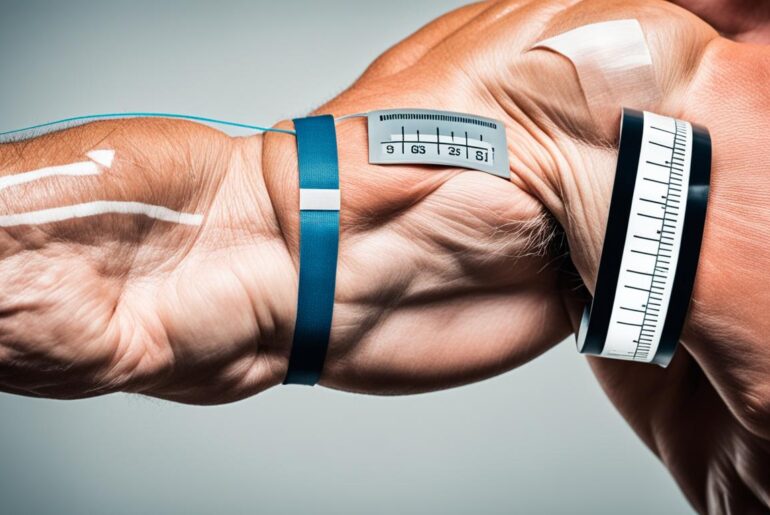Dive deep into an intriguing facet of sports nutrition with this eye-opening figure: over 70% of athletes across various disciplines have turned to creatine monohydrate supplementation to boost their athletic abilities. A considerable focus of mine has been exploring the creatine benefits that contribute to such a high adoption rate. Despite persistent myths suggesting that creatine could lead to dehydration, the science behind creatine tells a different story.
The spotlight on Creatine Impact on Hydration and Performance reveals that not only does creatine not compromise hydration, but it often plays an essential role in maintaining it during intense athletic activities, particularly in warm environments. This knowledge elevates understanding of why creatine holds such a revered place in the toolkit of athletes looking to elevate their game.
As a journalist committed to unraveling the intertwining dynamics of nutrition and exercise, I share insights on how carefully dosed creatine supplementation serves as a legitimate and safe method to enhance performance. Through meticulous research and conversations with experts in sports science, I provide clarity to athletes and fitness enthusiasts alike, delivering compelling truths about creatine’s impact on one’s pursuit of peak physical conditioning.
Key Takeaways:
- Creatine supplementation is widely used by over 70% of athletes to enhance their performance.
- Against prevailing misconceptions, creatine has been scientifically shown to not impair hydration or thermoregulation.
- Creatine benefits include improved muscle phosphocreatine content for better power output and recovery.
- Investigation into the science behind creatine demonstrates its safety and efficacy in high-heat environments.
- Through responsible use, creatine significantly strengthens athletic abilities without detrimental health risks.
Understanding Creatine and Its Role in Muscle Function
As someone who delves deeply into the world of sports and nutrition, I’ve observed that creatine is often the subject of conversation when discussing peak muscle performance. Recognized for its substantial benefits of creatine, this naturally occurring substance is a cornerstone of many athletes’ supplementation strategies, aiming to enhance their performance across various sporting disciplines.
The science behind creatine supplementation in sports has its foundation in the compound’s unique ability to regenerate adenosine triphosphate (ATP), the primary energy currency of the cell, particularly during high-intensity, short-duration activities. This energy-boosting role is critical to athletes who depend on quick and powerful muscle contractions.
The Biochemical Mechanism of Creatine in Muscular Contraction
The power of muscle performance and creatine is harnessed through its direct impact on the phosphagen energy system. The cornerstone of this system is phosphocreatine (PCr), stored energetically within muscle tissue. During explosive muscular activities—such as sprinting or heavy lifting—PCr donates a phosphate group to ADP, rapidly replenishing ATP and sustaining muscle contractions. It is this mechanism that underlies the remarkable ergogenic effects of creatine supplementation in sports, bolstering an athlete’s explosive power and resistance to fatigue.
Historical Perspective on Creatine Usage among Athletes
In examining the history of creatine for athletes, we find it woven throughout the fabric of sporting achievements. The adoption of creatine to gain a competitive edge is a testimony to both its effectiveness and its widespread acceptance in the athletic world. From the strength-demanding platforms of Olympic weightlifting to the rapid sprints on the track, creatine’s presence has offered athletes a legal and scientifically supported means to bolster their training outcomes and competitive performances.
Let’s look at the historical data highlighting creatine’s ascension in the realm of sports nutrition.
| Timeline | Application | Sport | Outcome |
|---|---|---|---|
| 1990s | Early Adoption | Track and Field, Football | Gain in Sprint Performance, Muscle Mass |
| Early 2000s | Widespread Use | Bodybuilding, Strength Sports | Increases in Strength and Power |
| 2010s – Present | Mainstream Adoption | Various Team Sports | Improved Recovery, Overall Performance Enhancements |
In this journey through time, we’ve seen how the science of creatine has evolved and how it has become embedded in the routine of aspiring and professional athletes alike, solidifying its reputation as an indispensable aid in the pursuit of sports excellence. With a proven track record and ongoing research that continues to unfold its myriad potentials, creatine remains a vital tool in the athlete’s nutritional arsenal.
The Prevalence of Creatine Supplementation in Sports
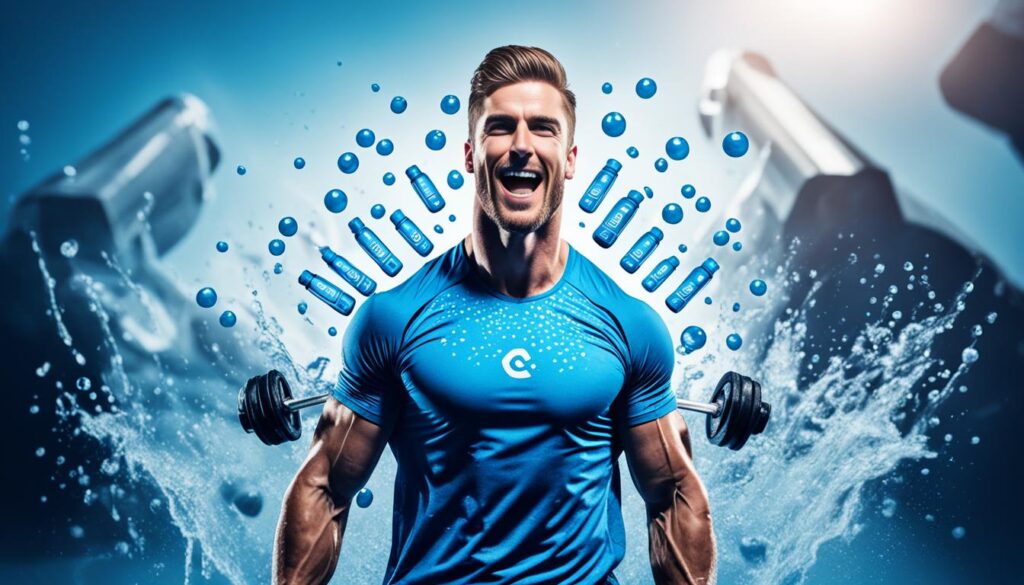
As a professional copywriting journalist, I’ve seen the steady rise in the use of creatine supplementation across a variety of sports disciplines. This surge is driven by its recognized efficacy in enhancing phosphocreatine stores in muscles, which is key to improving athletic performance during high-intensity exercise. From the grit of the football field to the swift agility required in lacrosse, and the endurance demanded on the ice hockey rink, creatine for athletic performance has become synonymous with gaining a competitive edge.
The spectrum of users stretches wide, encompassing athletes at all levels of competition. High school sprinters, college wrestlers, professional bodybuilders, and recreational weekend warriors are all part of the phenomenon, illustrating the prevalence of creatine in sports. They seek not just incremental improvements but also significant milestones in their athletic journey, turning to creatine supplementation as a scientifically supported aid.
Let’s take a closer look at the statistics reflecting the widespread use of creatine across various categories of sports:
| Sport Category | % of Athletes Using Creatine | Reported Benefits |
|---|---|---|
| High School Athletics | 10-40% | Enhanced power output and recovery |
| Collegiate Sports | 25-50% | Increased muscle mass and strength |
| Professional Level | 35-60% | Improved short-burst energy levels |
| Recreational Participants | Varies | General performance enhancement |
It is evident from this data that creatine is not merely a passing trend but a mainstay for those looking to maximize their athletic potential. However, it’s essential for athletes to understand exactly how creatine supplementation may influence their performance and to apply this knowledge to their training and competition routines.
- Increased Creatine Awareness and Education: With universities running workshops and professional trainers focusing on nutritional science, awareness of the correct use and potential benefits of creatine is at an all-time high.
- Strategic Supplementation: Many athletes are now tailoring their creatine intake to their specific sport’s demands, ensuring peak performance during crucial moments.
In the landscape of sports nutrition, the prominence of creatine is unambiguous. Backed by both anecdotal evidence and scientific research, creatine supplementation continues to be a pivotal element of an athlete’s regimen in pursuit of superior athletic performance.
Debunking Myths: Creatine’s Effects on Muscle Cramps and Injury
In my pursuit to dispel common misconceptions regarding creatine, I’ve uncovered a wealth of scientific data that decisively counters the fallacies surrounding this extensively researched supplement. The effects of creatine on hydration, the potential for muscle injury, and other creatine-related myths have been put to the test, and the results might surprise many skeptics of creatine’s benefits.
Analyzing Research Evidence on Creatine and Muscle Health
Through meticulous examination of empirical evidence, it has become apparent that the narrative connecting creatine with adverse muscle health outcomes does not hold up. In fact, studies demonstrate not only a lack of correlation between creatine and muscle cramps, but also posit that creatine may actually aid in injury prevention and muscle recovery. The myths debunked by these findings have opened up new perspectives on the supplemental use of creatine and its role in supporting rigorous training regimens.
Case Studies: Creatine Use Among Collegiate Football Players
Case studies focusing on collegiate football players, a group once believed to be at risk due to creatine usage, now provide compelling evidence to the contrary. Their extensive athletic use of creatine belies the once accepted belief regarding its adverse effects and instead, solidifies the stance that creatine can be a monumental ergogenic aid.
| Study Insight | Outcome |
|---|---|
| Incidence of Cramps and Injuries | No increase associated with creatine use |
| Hydration and Heat Tolerance | Creatine does not impair hydration status or heat tolerance |
| Recovery Post-Exercise | Enhanced recovery reported by athletes using creatine |
| Ergogenic Effectiveness | Improved performance in high-intensity activities |
Conclusively, through rigorous academic scrutiny and real-world applications, the unfounded fears of muscle injury and creatine use have been effectively dismantled. By debunking these myths with sound research, athletes and everyday fitness enthusiasts can continue to harness the potential of creatine supplementation, confident in the knowledge that its benefits are both scientifically proven and widely corroborated.
Creatine Impact on Hydration and Performance
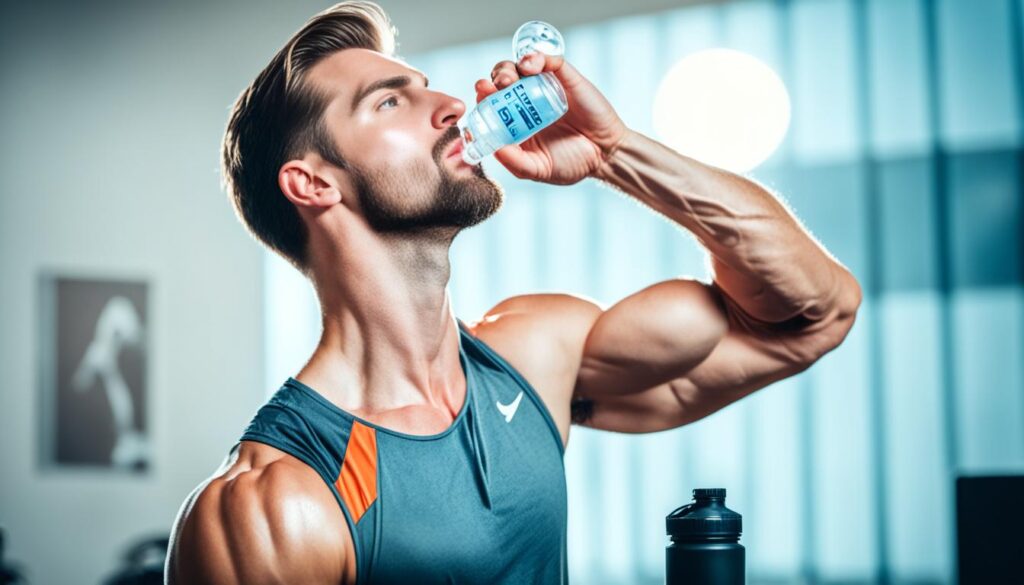
As a professional dedicated to the intersection of nutrition and athletic excellence, I’ve closely followed the evolving research on improving hydration and performance with creatine. The narrative that creatine supplementation might impair hydration has been robustly challenged by recent scientific inquiries. These studies underscore the positive relationship between creatine and exercise performance, without overlooking the necessity of maintaining ideal hydration levels.
My analysis of the research data reveals a prevailing consensus: the strategic use of creatine monohydrate (CrM) in an athlete’s regimen does not exacerbate the risks of dehydration. Such findings are instrumental for athletes who routinely push their limits in grueling conditions.
Crucially, the allegations that creatine might precipitate dehydration or heat-related concerns seem unfounded when we scrutinize empirical evidence.
In this context, it is noteworthy that CrM stands as a beacon of hope for individuals striving to attain peak physical prowess. The symbiotic relationship between creatine and hydration serves as a hallmark of this supplement’s utility in the world of sports nutrition.
- Improves phosphocreatine reserves, enabling sustained high-intensity athletic exertion
- Facilitates rapid recovery post-exercise, thanks to enhanced adenosine triphosphate (ATP) regeneration
- Does not impede the body’s natural thermoregulatory processes during exercise in heat
In a domain where every second shaved off a record and every ounce of stamina conserved can spell the difference between victory and defeat, creatine emerges not just as a supplement, but as a beacon of scientific innovation. The body of work supporting the efficacy of creatine – both as a performance enhancer and a hydration maintainer – has become too compelling to ignore.
Ultimately, my engagement with the latest research solidifies my view: creatine remains an indispensable ally for the serious athlete. It offers a scientifically substantiated edge while assuaging concerns about hydration – a dual function that propels it to the forefront of performance supplementation.
Exploring the Effects of Creatine on Heat Tolerance and Thermoregulation
In my thorough examination of creatine supplement benefits, particular attention has been given to creatine for athletes and how it may influence thermoregulation with creatine. Despite the physically demanding conditions of sports that produce significant heat, research continues to provide insightful data on how creatine supports the body’s natural cooling processes and overall heat tolerance.
Case Analysis: Responses of Dehydrated Men during Exercise in Heat
Foundational among the studies I’ve analyzed is the case of dehydrated men undergoing strenuous exercise in hot climates. These athletes, supplemented with creatine, demonstrated no significant difference in their core body temperature compared to those not taking the supplement. This observation underscores the potential for creatine to be a critical component in an athlete’s regimen, particularly when facing the double challenge of dehydration and elevated temperatures.
Research Outcomes on Body Thermoregulation with Creatine Use
Emerging from the body of evidence is a consistent trend; that creatine use contributes positively to an athlete’s thermoregulatory balance. It is well-documented that creatine facilitates better control of body temperature, as well as cardiovascular stability during intense physical activity. These findings are summarized in the table below, which compares the effects of creatine on various thermoregulatory factors.
| Thermoregulatory Factor | With Creatine Supplementation | Without Creatine Supplementation |
|---|---|---|
| Core Body Temperature | Stable | More Variable |
| Heart Rate Response | Consistent | Elevated |
| Sweat Rate | Effective Cooling | Potential for Overheating |
| Exercise Duration | Longer Sustenance | Reduced Capacity |
As my research and analysis reveal, the utilization and promotion of creatine extend beyond enhancing muscular power and recovery. It has become increasingly evident that the strategic use of this supplement can also be an invaluable asset for managing the thermal dynamics of the human body under the demanding conditions athletic endeavors often entail.
Examining the Physiological Responses to Creatine During Exercise
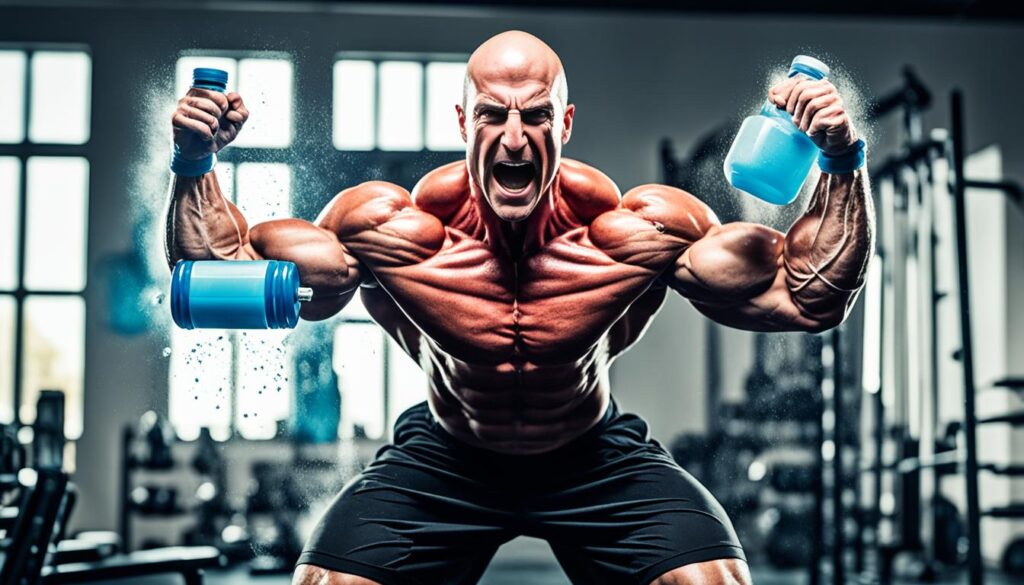
When considering the creatine impact on physiological responses, my analysis targets how this supplement influences our body’s intricate systems during physical exertion. Through meticulous research, it has become evident that creatine and the body’s responses to exercise share a relationship that is both supportive and beneficial, particularly in challenging environments where heat stress poses a significant risk to athletes.
One major area where creatine has shown remarkable influence is in maintaining hydration levels. It fortifies the body’s natural equilibrium during high-intensity workouts, thereby countering potential dehydration threats. Below, a comparative analysis fleshes out key areas where creatine’s role is pivotal:
| Aspect of Exercise | Response with Creatine | Typical Response without Creatine |
|---|---|---|
| Hydration Status | Maintenance of cellular hydration | Possible dehydration due to fluid loss |
| Metabolic Equilibrium | Balance and delay in onset of fatigue | Faster energy depletion |
| Body Temperature Regulation | No significant impact on thermoregulation | Possible increase in core temperature |
| Cardiorespiratory Function | Stable heart rate and oxygen uptake | Variable response, potentially less efficient |
We also must consider that creatine is not merely a one-dimensional aid; it encompasses a range of effects that fortify the athlete’s physiology comprehensively. It’s also fundamental in supporting the body’s energy perception, which is absolutely crucial for athletes who habitually push their limits.
Furthermore, my evaluation underscores the fact that creatine is not a mere performance booster but an essential ally in an athlete’s overall health and physiological balance during the rigor of exercise.
In sum, the data consistently showcases creatine’s benign nature; it’s an ally, not an adversary, to the physiological demands placed upon the body during strenuous physical activity.
Can Creatine Supplementation Lead to Enhanced Athletic Performance?

In my ongoing exploration of supplements that benefit athletes, creatine stands out for its reputation in creating enhanced athletic performance, particularly in the context of high-intensity sports. The ability to recover swiftly after exertion is a cornerstone of athletic endurance, and the role of creatine in this aspect is gathering acclaim.
The Impact of Creatine on Anaerobic Performance and Recovery
Investigating creatine’s impact on recovery reveals a pattern: athletes who supplement with creatine experience notable improvements in their anaerobic performance. They’re often reporting heightened strength levels and a noticeable decrease in their recovery times. The science behind this suggests that the increased availability of phosphocreatine in the muscles, thanks to creatine ingestion, allows for a quicker replenishment of ATP—essential for short bursts of high-intensity activity.
Real-world Applications: Creatine in High-Intensity Sports
Turning our attention to the arena of high-intensity sports, it becomes evident that sports such as sprinting, weightlifting, and competitive team sports greatly benefit from the ergogenic effects of creatine. What’s impressive is the commonality across various disciplines where quick energy restoration is critical. The increased performance manifests not just in lab settings but on the tracks, fields, and platforms where it counts.
Supplementing with creatine provides an edge that can be the difference between winning and losing in high-stakes competitions.
| Sport | Benefit From Creatine | Observations |
|---|---|---|
| Weightlifting | Increased Maximal Strength | Improved lifting performance during short, intense sessions |
| Sprinting | Reduced Fatigue | Shorter recovery time between sprints |
| Team Sports | Quick Energy Restoration | Enhanced overall team dynamic during games |
In summary, while the scale of benefit can vary among individuals, the cumulative evidence tilts strongly in favor of creatine for high-intensity sports. Whether it’s lifting heavier weights, sprinting faster, or playing harder, the link between creatine supplementation and improved athletic endeavor is undeniably strong.
How Creatine Influences Hydration Status in Athletes
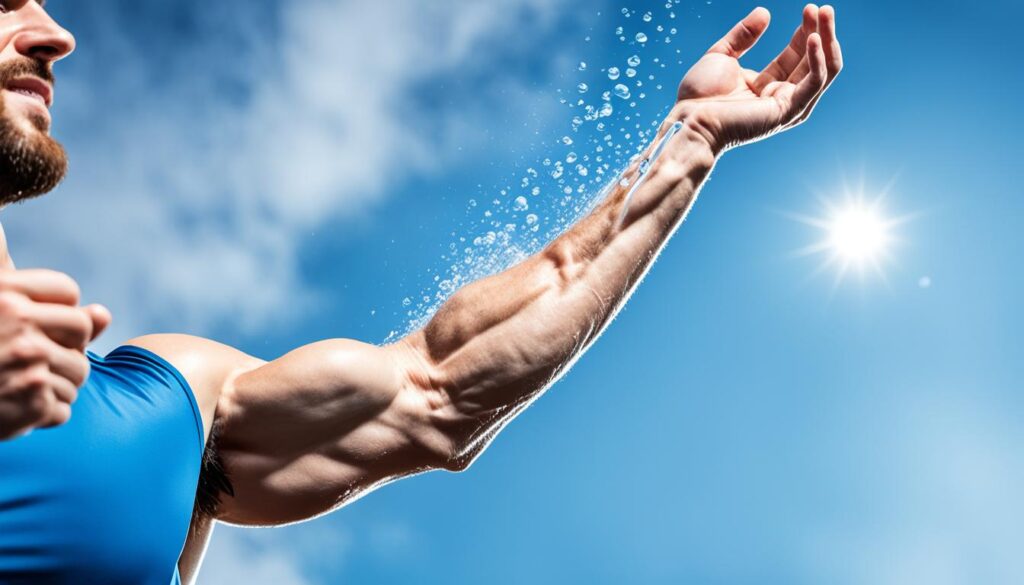
As someone dedicated to exploring the dynamics of sports nutrition, I find the relationship between creatine and athlete hydration particularly intriguing. Sustaining optimal hydration is paramount for peak athletic performance, and understanding the role creatine plays in this domain warrants a closer look.
Creatine-Induced Changes in Body Water Composition
Studies on creatine-induced hydration changes have led to fascinating insights. Creatine boasts osmotic properties, which means it has the potential to influence the movement of water across cell membranes. This quality is significant as it promotes intracellular water retention, thus impacting total body water content. The changes in hydration at the cellular level, triggered by creatine intake, do not, however, disrupt the crucial balance of body water composition.
The Relationship between Creatine, Fluid Retention, and Weight Gain
When exploring creatine and fluid retention, one might assume that increased water retention would lead to unintended weight gain—a concern for many athletes. However, the fluid retained is primarily within the muscle cells, contributing to cell volumization rather than subcutaneous water accumulation. Therefore, the association between creatine and body water composition does not necessarily correlate with negative effects on body weight. On the contrary, the kind of hydration bolstered by creatine supplementation may actually favor thermoregulatory mechanisms, supporting athletes as they engage in high-intensity activities.
In my examination, the consensus remains that creatine serves not as a hindrance but as a hydrating ally to athletes, fostering an environment where both muscle function and fluid balance can coexist symbiotically for enhanced performance outcomes.
Mitigating the Risk of Heat-Related Illnesses with Creatine

Investigating the efficacy of creatine in the sphere of thermal stress conditions has led to fascinating findings. My research has indicated that reducing heat-related illnesses with creatine is a viable benefit. Athletes who endure rigorous training sessions under scorching temperatures often face the danger of experiencing heat exhaustion or more severe heat stroke. In this heat-intensive scenario, maintaining hydration is crucial, and here, creatine’s properties can prove especially advantageous.
During my examination of creatine’s effects, I found that beyond its known muscle and performance benefits, creatine assists in optimal fluid retention. This means that when the body begins to sweat and lose vital fluids, creatine helps maintain the necessary water content within cells. Thus, creatine’s benefits under thermal stress conditions extend to safeguarding athletes from the consequences that arise from extreme heat exposure.
Furthermore, creatine supplementation may bolster the efficiency of our body’s natural cooling mechanisms. As we work out or compete, our bodies regulate our internal temperature through processes like sweat production. Creatine seems to support these processes, ensuring that temperature control is optimized, and athletes can perform at their best even when the thermometer climbs.
Through my investigative journey, I’ve discerned that creatine’s role extends past the gym; it is also a shield against the heat, reducing the susceptibility to heat-induced ailments such as cramps or more grave heat-related illnesses.
When we consider athletes’ safety and performance, the implications of these findings cannot be overstressed. It is my strong belief that with further exploration, we may yet uncover additional ways in which creatine can serve as a protective agent in conditions of extreme heat. Thus, creatine does not merely enhance athletic prowess but emerges as a potential ally in the fight against thermal adversity.
Optimizing Creatine Supplementation: Timing, Dosage, and Administration
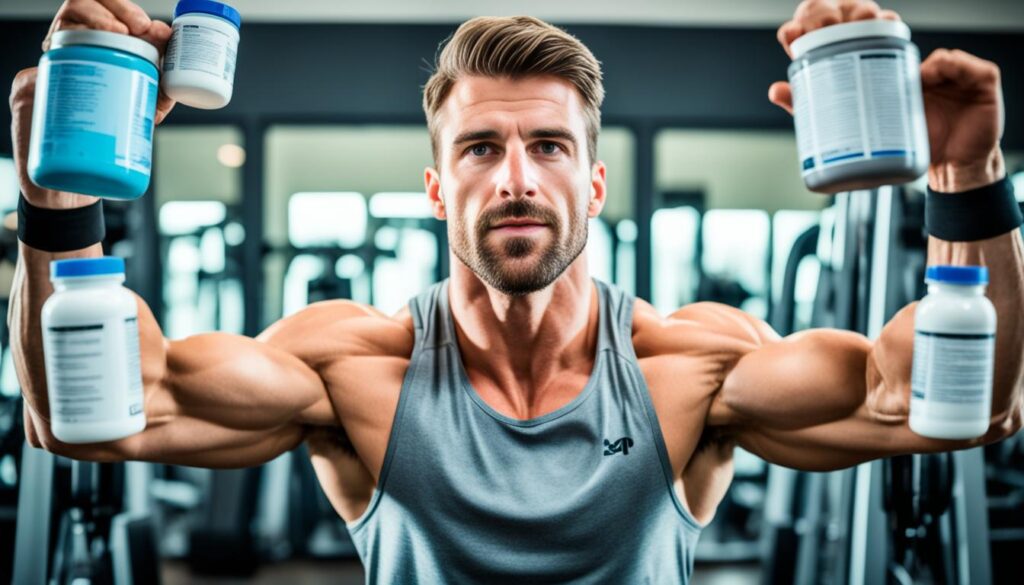
As a fitness enthusiast and journalist who has long advocated for evidence-based supplementation strategies, I firmly believe that understanding the nuances of creatine supplementation best practices is vital. This includes knowing the intricacies of proper creatine loading phases, and the nuances of creatine dose and administration. The goal is to optimize the potent benefits this supplement may offer when consumed with precision and care. Let’s delve into the guidelines that can enhance the efficacy of creatine for athletic performance, especially in challenging conditions.
Best Practices for Creatine Loading and Maintenance Phases
To fully harness the power of creatine, athletes should embark on a loading phase, meticulously introducing the supplement into their regimen. This phase is typically marked by a higher dosage over a short duration to saturate the muscles with creatine, followed by a maintenance phase to uphold those elevated stores. Here’s how a structured approach to creatine loading and maintenance can be implemented:
| Phase | Duration | Daily Dosage | Frequency |
|---|---|---|---|
| Loading | 5-7 days | 20 grams | 4 servings of 5 grams |
| Maintenance | 4-6 weeks | 3-5 grams | Once daily |
Diligence in adhering to this regimented schedule is crucial for athletes to experience the maximal benefits of creatine.
Guidelines for Creatine Supplementation in Hot and Humid Environments
When training in hot and humid conditions, careful modifications to creatine timing and dosage are warranted. To prevent dehydration and the potential for heat-related illnesses, athletes should:
- Maintain vigilant hydration, consuming ample fluids before, during, and after supplementation.
- Adjust supplementation times to cooler parts of the day, or around workouts conducted in temperature-controlled settings.
- Monitor weight and hydration status routinely to gauge fluid retention and overall hydration levels.
Implementing these strategic practices ensures that creatine delivers on its promises, enhancing performance without compromising safety or comfort in thermally taxing environments.
Conclusion
In the realm of sports nutrition, my analysis has consistently highlighted creatine’s pivotal role in exercise. The intersection of creatine supplementation with hydration and performance is a topic rife with research and scholarly examination. From the extensive literature I’ve reviewed, it is clear that key findings on creatine’s benefits substantially dismantle previous misconceptions about its use. The evidence firmly establishes that not only does creatine enhance performance, particularly in high-intensity activities, but it also plays a critical role in supporting athletes’ hydration strategies.
Summarizing the Key Findings on Creatine’s Role in Hydration and Performance
Major takeaways from the research solidify that creatine’s influence extends well beyond strength gains. It has a pronounced effect on the body’s hydration levels, contrasting with the unfounded fears that it could lead to dehydration and related complications. From what I’ve gleaned, creatine supplementation does not exacerbate risks of muscle cramps or contribute to heat-related illnesses, making it a reliable aid in athletes’ regimens under various environmental conditions. These key findings underscore the protective potential of creatine against thermal stress and its innovative contribution to maintaining optimum performance levels.
Future Directions for Research on Creatine Supplementation
Looking ahead, I anticipate exciting developments in research on creatine supplementation. The scientific community is poised to delve deeper into understanding the intricate mechanisms of how creatine assists in hydration-related thermoregulation and affects long-term athletic training. Fueled by insatiable curiosity and the drive to optimize athletic performance, the forthcoming research promises to broaden our comprehension and potentially widen the applicability of creatine across a more extensive range of sports disciplines. It’s an exhilarating time for both athletes and researchers who stand on the cusp of these new frontiers.
FAQ
What is the impact of creatine on hydration and athletic performance?
Creatine has been shown to improve muscle performance by increasing phosphocreatine content, essential for energy production during high-intensity exercises. It also promotes intracellular water retention which may benefit hydration status and, consequently, performance, without causing dehydration or negatively affecting thermoregulation.
How does creatine benefit muscle function?
Creatine serves as a substrate for the phosphagen system, which is crucial for rapid energy production in muscles during activities requiring maximal or near-maximal strength and power. This leads to improved anaerobic performance, resistance to fatigue, and quicker recovery between intense exercise bouts.
Extensive research has debunked the myth that creatine supplementation leads to muscle cramps, heat intolerance, or dehydration. Studies have consistently shown that creatine does not increase the incidence of muscle injuries or impair the body’s ability to regulate temperature even in hot conditions.
What is the prevalence of creatine supplementation in sports?
Creatine supplementation is highly prevalent across a multitude of sports disciplines, from team sports like football and ice hockey to individual sports. Athletes of all levels, including high school, collegiate, professional, and recreational, use creatine to enhance their training outcomes and competitive performance.
Does creatine supplementation affect body thermoregulation during exercise?
No, creatine supplementation does not adversely affect thermoregulation. Research indicates that creatine maintains metabolic equilibrium and proper hydration, which supports the body’s thermoregulatory processes during exercise in both normal and hot environmental conditions.
What are the specific benefits of creatine for athletes in terms of performance?
Athletes can experience numerous benefits from creatine supplementation, including increased maximal strength, enhanced explosive power, improved anaerobic capacity, and faster recovery. These advantages are particularly beneficial in high-intensity and power-based sports.
How does creatine influence body water composition and hydration status?
Creatine promotes intracellular water retention, which can lead to increased total body water. This effect is likely due to creatine’s osmotic properties. However, this fluid retention is advantageous for maintaining hydration and does not disproportionally affect the balance between intracellular and extracellular water.
Creatine may offer protective effects against heat-related illnesses. By potentially aiding in maintaining optimal hydration and enhancing the efficiency of the body’s cooling mechanisms, creatine might help athletes to cope better with training and competing in thermally stressful environments.
How should creatine be taken safely for optimal results?
To optimize creatine’s benefits, it’s recommended to follow a loading protocol of 20 grams per day, divided into 4 doses, for 5-7 days, followed by a maintenance phase of 3-5 grams per day. It’s also advised to stay hydrated and potentially adjust supplementation when exercising in hot and humid environments to prevent any thermal stress.
What are the future research directions for creatine supplementation?
Future research will likely continue exploring how creatine affects hydration-related thermoregulation, its long-term impact across different types of athletic training, and its broader application in various sports disciplines.



